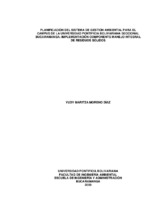Planificación del sistema de gestión ambiental para el campus de la Universidad Pontificia Bolivariana Seccional Bucaramanga: implementación componente manejo integral de residuos sólidos
Fecha
2013-07-16Director/Asesor
Castro Bernal, Guillermo Iván
Tipo de contenido
bacherlorThesis
Citación
Metadatos
Mostrar el registro completo del ítemDocumentos PDF
Resumen
La estructuración conceptual de un Sistema de Gestión Ambiental para el campus universitario de la Pontificia Bolivariana Seccional Bucaramanga tiene como propósito principal plantear mecanismos de planificación que permitan a través de procesos integrales de gestión interna y externa la minimización de los impactos, producto de sus actividades cotidianas como institución de Educación superior, al ambiente o entorno inmediato El presente trabajo se realizó metodológicamente siguiendo cinco fases. Una fase inicial de revisión y análisis mediante la actualización de la Revisión Ambiental Inicial, donde se determinan las áreas académicas y administrativas de interés ambiental de la Universidad, identificando elementos principales de entrada y salida en cada área, generando así una descripción de la situación ambiental actual de las mismas. En una segunda fase se establece la estructura conceptual y metodológica de los componentes de Manejo Integral de Residuos Sólidos, Uso y Manejo Integral del Agua y Energía y Educación Ambiental para el Sistema de Gestión Ambiental. En la tercera fase se realiza una identificación y valoración de los impactos ambientales, utilizando la metodología: MATRIZ SIMPLE DE LEOPOLD, a través de la cual se establecen las afectaciones al ambiente más significativas como producto de las actividades desarrolladas en el campus, estableciendo los programas de Manejo Integral de Residuos Sólidos, Educación Ambiental, Uso y Manejo Eficiente de Agua y la Energía. La quinta fase corresponde al proceso de implementación del Programa de Manejo Integral de Residuos Sólidos para el campus, en donde se presenta la caracterización de los residuos sólidos generados en la Universidad, un estudio sobre el análisis de ciclo de vida de tres productos de generación frecuente como las Botellas de Polietileno de alta densidad, el papel de impresión y las botellas de vidrio. Se muestran la implementación de nuevos puntos ecológicos de almacenamiento de los residuos y una estrategia de educación ambiental. The conceptual structure of an Environmental Management System to the campus of the Pontificia Bolivariana Bucaramanga Section aims to pose major planning mechanisms that allow processes through integrated internal and external management to minimize impacts, resulting from daily activities as an institution of higher education, the environment or immediate surroundings This work was carried out methodically by following five steps. An initial phase of review and analysis by updating the Initial Environmental Review, which identifies academic and administrative areas of environmental interest of the University, by identifying key entry and exit in each area, thus generating a description of the environmental situation present them. In a second phase establishes the conceptual and methodological structure of the components of Integrated Solid Waste Management, Use and Integrated Water Management and Energy and Environmental Education for Environmental Management System. In the third stage performs an identification and assessment of environmental impacts using the methodology: LEOPOLD simple matrix, through which establishes the most significant affect the environment as a result of the activities on campus, establishing programs of Integrated Solid Waste Management, Environmental Education, Efficient Use and Management of Water and Energy. The fifth stage is the process of implementing the Program of Integrated Solid Waste Management for the campus, where he presents the characterization of solid waste generated at the university, a study on life cycle analysis of three-generation products often Bottles such as HDPE, printing paper and glass bottles. Shows the implementation of new points of storage of organic waste and an environmental education strategy.
Palabra/s clave
Ingeniería ambiental
Tesis y disertaciones académicas
Gestión ambiental
Residuos sólidos
Colecciones
- Trabajos de grado [6698]


